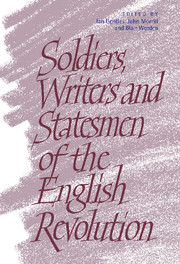Book contents
- Frontmatter
- Contents
- Preface
- Austin Woolrych: an appreciation
- 1 Secret alliance and Protestant agitation in two kingdoms: the early Caroline background to the Irish Rebellion of 1641
- 2 Of armies and architecture: the employments of Robert Scawen
- 3 George Digby, Royalist intrigue and the collapse of the cause
- 4 The iconography of revolution: England 1642–1649
- 5 The casualties of war: treatment of the dead and wounded in the English Civil War
- 6 ‘A bastard kind of militia’, localism, and tactics in the second civil war
- 7 Cromwell's commissioners for preserving the peace of the Commonwealth: a Staffordshire case study
- 8 Colonel Gervase Benson, Captain John Archer, and the corporation of Kendal, c. 1644—c. 1655
- 9 Repacifying the polity: the responses of Hobbes and Harrington to the ‘crisis of the common law’
- 10 Equality in an unequal commonwealth: James Harrington's republicanism and the meaning of equality
- 11 John Milton and Oliver Cromwell
- 12 From pillar to post: Milton and the attack on republican humanism at the Restoration
- 13 ‘They that pursew perfaction on earth …’: the political progress of Robert Overton
- 14 Locke no Leveller
- A bibliography of the writings of Austin Woolrych, 1955-95
- Index
10 - Equality in an unequal commonwealth: James Harrington's republicanism and the meaning of equality
Published online by Cambridge University Press: 10 November 2009
- Frontmatter
- Contents
- Preface
- Austin Woolrych: an appreciation
- 1 Secret alliance and Protestant agitation in two kingdoms: the early Caroline background to the Irish Rebellion of 1641
- 2 Of armies and architecture: the employments of Robert Scawen
- 3 George Digby, Royalist intrigue and the collapse of the cause
- 4 The iconography of revolution: England 1642–1649
- 5 The casualties of war: treatment of the dead and wounded in the English Civil War
- 6 ‘A bastard kind of militia’, localism, and tactics in the second civil war
- 7 Cromwell's commissioners for preserving the peace of the Commonwealth: a Staffordshire case study
- 8 Colonel Gervase Benson, Captain John Archer, and the corporation of Kendal, c. 1644—c. 1655
- 9 Repacifying the polity: the responses of Hobbes and Harrington to the ‘crisis of the common law’
- 10 Equality in an unequal commonwealth: James Harrington's republicanism and the meaning of equality
- 11 John Milton and Oliver Cromwell
- 12 From pillar to post: Milton and the attack on republican humanism at the Restoration
- 13 ‘They that pursew perfaction on earth …’: the political progress of Robert Overton
- 14 Locke no Leveller
- A bibliography of the writings of Austin Woolrych, 1955-95
- Index
Summary
At the heart of James Harrington's rhetorical aspiration in framing his most famous book lay a dilemma. Oceana appealed to ambition in order to incite an act of consummate self-effacement. Addressed to the Lord Protector, Oliver Cromwell, as he wrestled with the prospect of kingship, it appealed to his thirst for glory only in order to persuade him to suppress his own ambition and divest himself of power. Scipio was asked to become Lycurgus.
However much the difficulties of the mid-1650s, the challenges of healing and settling, might encourage Cromwell to regard any reasonable scheme with hope, this remained an over-sanguine agenda. Furthermore, as the once reluctant regicide contemplated taking the steps to the throne as a final exercise in conservative post-revolutionary reconstruction, those schemes which smacked of levelling were presumably beyond the bounds of the reasonable. The good and great interest of the nation remained the hierarchy of ‘a nobleman, a gentleman and a yeoman’. In the crisis of 1649 it was Cromwell who had urged the Council of State to break those who advocated legal and religious equality. Yet the notion of equality was pivotal both to Harrington's republicanism and to his utopianism. Republics had failed historically precisely because they were unequal. The republic proposed for Oceana in 1656 could be perfect and immortal only because it was equal.
The problem of Harrington's identification of equality as the essential feature of his republicanism has two dimensions. The more general one is that of its genesis and resonance in a society permeated with ideas of natural inequality, of hierarchy as the guarantor of order, and fearful of the association between levelling and anarchy.
- Type
- Chapter
- Information
- Soldiers, Writers and Statesmen of the English Revolution , pp. 229 - 242Publisher: Cambridge University PressPrint publication year: 1998
- 4
- Cited by



